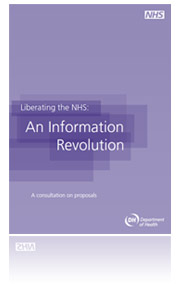
The Department of Health has launched a three month consultation on proposals to deliver an “information revolution” to users of the NHS.
The consultation paper launched this morning on the DH website says that with modern technology playing “an ever increasing part in our everyday lives” too much of the health and care system still relies on “face to face contact and paper based transactions, even when it is neither necessary nor appropriate.”
It also says change is needed to deliver the “no decision about me without me” promise at the heart of the government’s recent white paper, ‘’Equity and Excellence, Liberating the NHS.’
To deliver on this, the paper says the public, carers and patients not only need good information but “a culture that enables people to make use of it.”
It says this culture must be based on “accurate and up to date health and care records” since these “form the basis of information systems for patients and service users.”
It also flags up a bigger role for information to support self-care and to encourage people to make healthy choices “and “act as the basis for taking more responsibility for their own health and well being.”
In a foreword to the paper, health secretary Andrew Lansley says: “Information is a health and care service in its own right. It must be freely available to all who need it.
“We need an information revolution to ensure that what is currently seen as good practice becomes the norm. We must start by ensuring that accurate data is recorded at the point of care, as this forms the basis of information sued for so many other purposes across the health and care system.
“The challenges ahead are significant, but so is the prize: improved outcomes and services that fully meet the needs and expectations of the health service.”
The paper – at 70 pages as long as the white paper that preceded it – also devotes chapters to providing better information for professionals, for promoting accountability, and for making the changes necessary to bring a revolution about.
It says steps are needed to improve data quality, key parts of the healthcare record, the use of clinical terminology and the NHS Number – which it says should become a unique identifier – and to clarify the roles of the new NHS Commissioning Board and the Department of Health.
The paper says the Board will “set and maintain a portfolio of national information standards for the NHS” with the DH setting equivalent standards for public health and social services.
It looks to professional bodies and the Royal Colleges for action to improve data keeping and record structuring, and sets out some areas for the “early standardisation of recording” such as diagnoses and medication.
It says the health service will “build on initiatives such as the NHS interoperability toolkit” to join information systems together, and flags up some NHS Connecting for Health programmes such as Choose and Book as foundations to build on.
However, in line with the recent announcement by health minister Simon Burns on the future – or lack of it – for the National Programme for IT in the NHS, it makes no mention of CfH or of the programme’s contracts for record systems.
“The market should innovate and not stop at the minimum that the NHS expects,” it says.
“There should be a new culture, which promotes the creation of value through information, where patient choice and patient control of records becomes the driver for all stakeholders to raise their game.”
Link: Liberating the NHS: an information revolution
Read: Our initial reaction to the consultation in ‘Reboot NHS Information.’
